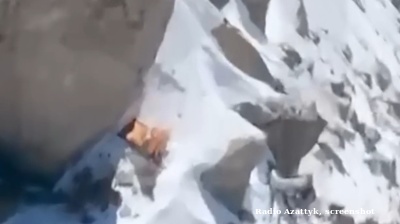Russia has formally recognised the Taliban administration in Afghanistan, becoming the first country to do so since the group seized power in August 2021, the Russian Ministry of Foreign Affairs confirmed on July 4.
The move marks a significant shift in Moscow’s foreign policy and breaks with the stance held by the broader international community, which continues to withhold official recognition of what many still regard as an extremist and terrorist group.
“We believe that the act of official recognition of the government of the Islamic Emirate of Afghanistan will give impetus to the development of productive bilateral cooperation between our countries in various fields,” the Russian foreign ministry said in a statement, Al Jazeera reports.
Moscow intends to deepen cooperation in key sectors including energy, transport, agriculture and infrastructure, the statement added. Afghanistan’s importance to Moscow has been multiplied by its clash with the west and the extreme sanctions regime as Russia is very keen to develop a southern trade route to Asia, but the route is currently corked by instability in Afghanistan and the prickly Taliban government.
The Russian announcement comes after years of cautious diplomatic engagement with the Taliban and decades after the two sides fought bitterly during the Soviet occupation of Afghanistan in the 1980s.
The Afghan Ministry of Foreign Affairs confirmed the news in a post on X, stating that Russian ambassador Dmitry Zhirnov had informed Afghan Foreign Minister Amir Khan Muttaqi of the Kremlin’s decision.
In a video statement posted to the same platform, Muttaqi said: “We value this courageous step taken by Russia, and, God willing, it will serve as an example for others as well.”
Although several countries have engaged diplomatically with the Taliban since their return to power—including hosting delegations and maintaining embassies—none had formally recognised the administration until now. The United Nations continues to refer to the Taliban as the “de facto authorities” and does not accept their appointees to represent Afghanistan at the UN.
Russia’s recognition comes amid broader efforts to reassert its influence in Central and South Asia as it seeks to counterbalance Western power and build strategic partnerships outside of the NATO sphere. The Kremlin has hosted Taliban delegations in Moscow on multiple occasions in recent years and has emphasised the need for regional stability and counter-terrorism cooperation.
The move may increase pressure on other regional actors, including China, Iran and Pakistan, to clarify their own positions. It also raises questions about whether wider international recognition could follow, particularly from countries already engaging with the Taliban on security and trade.
China began building ties with the Taliban before the U.S. withdrawal from Afghanistan, hosting Taliban leaders in 2019 for peace talks. Since the group’s return to power, Beijing has deepened engagement, including a landmark 25-year oil extraction deal in 2023 with a Chinese state-owned firm. In 2024, China formally accepted a Taliban envoy, Bilal Karim, though it stopped short of recognising the Taliban government. Most recently, China hosted a trilateral summit with Taliban and Pakistani officials in May 2025.
Pakistan has seen a sharp deterioration in relations with the Taliban since 2021, blaming Kabul for sheltering the Tehreek-e-Taliban Pakistan (TTP), which is responsible for deadly cross-border attacks. In response, Pakistan launched air strikes in Afghanistan’s Paktia province in late 2024, killing dozens of civilians according to Taliban claims. Islamabad has also escalated the deportation of Afghan refugees, aiming to expel up to three million. Despite tensions, senior Pakistani and Afghan officials held talks in April and May this year.
India had long opposed the Taliban, viewing it as a proxy of Pakistan and shutting its Kabul embassy in 1996. Although India restored its diplomatic presence after 2001, Taliban-linked attacks continued. Since the group’s 2021 return, New Delhi has cautiously re-engaged, reopening its embassy and initiating diplomatic contacts. In early 2025, Foreign Secretary Vikram Misri met Muttaqi in Dubai, followed by a phone call between Foreign Minister S. Jaishankar and the Taliban official in May.
Iran historically opposed the Taliban, especially after the 1998 killing of its diplomats in Mazar-i-Sharif. However, it now sees ISIS-K as a greater threat and has quietly engaged with the Taliban in recent years. In May 2025, Afghan Foreign Minister Amir Khan Muttaqi visited Tehran to attend the Tehran Dialogue Forum, where he held meetings with Iranian President Massoud Pezeshkian and Foreign Minister Abbas Araghchi, signalling Tehran’s continued diplomatic outreach.
News

Russia orders emergency operation in race to save mountaineer trapped on Kyrgyzstan’s highest peak
Top official responds to desperate appeal from climber Natalia Nagovitsyna’s son who believes she is still alive.
_1756222537.jpg)
End of Bolivia's leftist era leaves Chinese and Russian lithium deals in limbo
Bolivia’s October presidential run-off has become a contest not only between two political traditions but also over the management of the country’s vast but underdeveloped lithium resources.

UPDATED: Kosovo gets parliament speaker but months-long political stalemate persists
Prolonged political deadlock had prevented Kosovo's assembly from functioning and blocked the formation of new state institutions since the February general election.

Turkey’s “fast lane” transport minister hit with motorway speeding ticket
Abdulkadir Uraloglu posted video of himself driving at 225 km/h, with clip set to folk music and Erdogan speeches on infrastructure.




